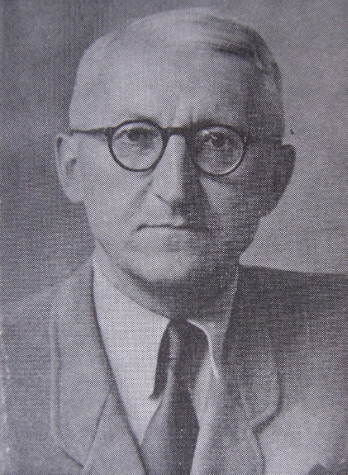Shlemkevych, Mykola
Shlemkevych, Mykola [Шлемкевич, Микола; Šlemkevyč] (pseudonyms: M. Ivaneiko, S. Vilshyna, R. Sribny), b 27 January 1894 in Pyliava, Buchach county, Galicia, d 14 February 1966 in Passaic, New Jersey. Philosopher, publicist, and political figure; full member of the Shevchenko Scientific Society from 1941 and the Ukrainian Academy of Arts and Sciences. His studies at Vienna University were interrupted by the First World War, and in 1915 he was deported by the Russian occupational authorities from Galicia to Siberia. As editorial secretary of the paper Robitnycha hazeta (1917–19) in Kyiv he witnessed the rebirth and defeat of Ukrainian independence. While completing his studies at Vienna University (PH D, 1926) he began contributing to Literaturno-naukovyi vistnyk. After studying at the Sorbonne (1928–9) he returned to Lviv, became an ideologue of the Front of National Unity, and edited its journal Peremoha (1933–9) and paper Ukraïns’ki visty (1935–9). During the Second World War he headed the publishing department of the Ukrainske Vydavnytstvo (Cracow) publishing house in Cracow and Lviv (1941–4). As a postwar refugee in Vienna and then Munich, he was a founding member of the Ukrainian National State Union, the deputy chairman of its executive council, a founding member of the Ukrainian National Council, and a member of MUR. After emigrating to New Jersey in 1949, he cofounded the Union of Ukrainian National Democrats (1950), founded and edited Lysty do pryiateliv (1953–66), and founded the Kliuchi publishing house (1956) and the Ukrainian Research and Information Institute (1961). Besides many articles in the Galician and émigré press, he wrote several books on Ukrainian culture and political thought, including Ukraïns’ka synteza chy ukraïns’ka hromadians’ka viina (A Ukrainian Synthesis or a Ukrainian Civil War, 1946; 2nd edn, 1949), Zahublena ukraïns’ka liudyna (The Lost Ukrainian Person, 1954), and Halychanstvo (Galicianness, 1956). His chief philosophical work, Filosofiia (Philosophy, 1934; 2nd edn: Sutnist’ filosofiï [The Essence of Philosophy], 1981), a revised translation of his PH D dissertation, criticizes absolutist (W. Windelband, H. Rickert, W. Wundt, G. Fechner, M. Schlick, A. Comte, and E. Mach), relativist (K. Fischer and W. Dilthey), and classical (Plato and Immanuel Kant) definitions of philosophy and argues from the historical evidence that philosophy has three tasks: to criticize the existing spiritual culture (science, art, and religion), to articulate problems to the point at which they can be handled by science, and to unify the different spheres of spiritual culture in a coherent worldview.
Taras Zakydalsky
[This article originally appeared in the Encyclopedia of Ukraine, vol. 4 (1993).]

